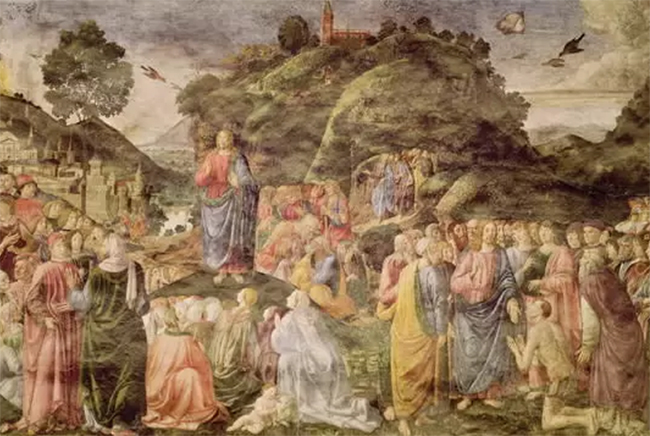Christian Art | Hypocrites
Matthew 7: 1-5 – Week 12 Ordinary Time, Monday (Audio Bible KJV, Spoken Word)
1 JUDGE not, that ye be not judged.
2 For with what judgment ye judge, ye shall be judged: and with what measure ye mete, it shall be measured to you again.
3 And why beholdest thou the mote that is in thy brother’s eye, but considerest not the beam that is in thine own eye?
4 Or how wilt thou say to thy brother, Let me pull out the mote out of thine eye; and, behold, a beam is in thine own eye?
5 Thou hypocrite, first cast out the beam out of thine own eye; and then shalt thou see clearly to cast out the mote out of thy brother’s eye.
Jesus continues to preach the Sermon on the Mount with a further lesson in love and humility. Once more, Jesus teaches us about our proper relationships with God and with other people. This is a lesson against conceit and anger. It is a call to peace, such as can heal the divisions between people.
Jesus reminds us that we are all imperfect. Through prayer, as we seek to live closely with God, and to reconcile ourselves with God, we present ourselves to God’s mercy and acknowledge our failings and weaknesses. We ask God to be kind and not to judge us. We are not justified through merit, but through grace. Our faith, our receptivity to God’s grace, depends upon our remembering to transcend those worldly instincts, our animal passions, which would rather seek to assert self-importance and pride, thereby distancing ourselves from the gift of grace.
Jesus asks us to realise that to judge other people is to set ourselves up, absurdly, in God’s place. Who are we to judge? Are we so perfect? What arrogance it would be to arrogate to ourselves the right to define another person’s worth, especially when seeking that this should be to our own advantage..
Such judgement represents a descent into hatred and ignorance. It is not good for he who judges. Through ‘puffing ourselves up’ in condemnation of others, we cease to love and our ability to confess our failings before God is compromised.
This can be easier said than done. It can be challenging to preserve an attitude of love. Perhaps we like to find excuses to judge others, rather than open ourselves completely to God and to mourn for the sins we have committed. Self-knowledge, honesty, can be a great challenge, and can constitute an emotional journey.
Jesus teaches us in these Gospel verses that we do not need to be scared of admitting to our own shortcomings. Jesus uses comically exaggerated language, when he speaks of there being a beam in our own eye, to set us at ease and to enable us to recognize the truth of what he says. Once again, Jesus lets us know that the ‘burden’ of Christianity is easy to bear. There is a lightness to life when we live with Jesus. We are cleaned of the truly sorry burden of ego. The truth is beautiful.
‘Let us be slow to judge. Each one sees things from his own point of view, as his mind, with all its limitations, tells him, and through eyes that are often dimmed and clouded by passion… To criticize, to destroy, is not difficult; any unskilled labourer knows how to drive his pick into the noble and finely-hewn stone of a cathedral. To construct: that is what requires the skill of a master.’ St Josemaria Escriva.
Concluding Prayer
Stay with us, Lord Jesus, as evening falls:
be our companion on our way.
In your mercy inflame our hearts and raise our hope,
so that, in union with our brethren,
we may recognize you in the scriptures,
and in the breaking of Bread.
Who live and reign with the Father and the Holy Spirit,
God, for ever and ever.

![]()
Audio Bible KJV | Endnotes
Hypocrites
The word ‘hypocrite’ is used often in the Bible, particularly in the New Testament. The term originally referred to actors who wore masks in Greek theatre, playing different roles to deceive the audience. In Matthew 7:1-5, Jesus warned against hypocritical judgment:
‘Judge not, that ye be not judged. For with what judgment ye judge, ye shall be judged: and with what measure ye mete, it shall be measured to you again. And why beholdest thou the mote that is in thy brother’s eye, but considerest not the beam that is in thine own eye? Or how wilt thou say to thy brother, Let me pull out the mote out of thine eye; and, behold, a beam is in thine own eye? Thou hypocrite, first cast out the beam out of thine own eye; and then shalt thou see clearly to cast out the mote out of thy brother’s eye.’ (Matthew 7:1-5, KJV)
Jesus warns against the hypocrisy of judging others while ignoring one’s own faults. The message is clear: before pointing out the faults of others, we must first examine ourselves and our own shortcomings.
Christians have discussed the concept of hypocrisy and the importance of avoiding it. Protestant Reformer Martin Luther wrote: ‘To be a Christian without prayer is no more possible than to be alive without breathing.’ Martin Luther emphasizes the importance of genuine faith and devotion to God, rather than merely performing religious actions without true conviction.
Saint Francis de Sales wrote: ‘The true way to advance in holy virtues is to persevere in prayer.’ He stresses the importance of personal devotion and seeking a deeper relationship with God, rather than merely performing religious actions as a form of self-promotion or hypocrisy.
John Wesley, founder of Methodism, also emphasized the importance of avoiding hypocrisy. Wesley wrote: ‘Cleanse your heart from every kind and degree of hypocrisy, and let all your things be done as in the presence of God.’ Wesley believed that true faith and genuine devotion to God would naturally lead to righteous actions, rather than empty displays of religious practice.
In the modern era, religious leaders continue to emphasize the importance of avoiding hypocrisy. Pope Francis has spoken frequently about the dangers of hypocrisy and the importance of living a genuine, compassionate life. He has said: ‘When we are indifferent to the suffering of others, when we close our hearts to the needs of the poor, we are not disciples of Jesus; we are disciples of our own ego.’








